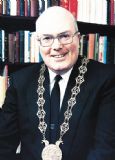Mr Michael J Boyd

THE death has taken place of former Down councillor Mr Michael Boyd. He was 73.
Born on April 17, 1944, he was the only child of the late William and Margaret Boyd (née Clarke). Growing up in Belfast, he was educated at St Mary’s Christian Brothers School, St Joseph’s College of Education and Queen’s University before commencing his teaching career which spanned over three decades.
Mr Boyd held many different positions and titles throughout his life, including school teacher, vice-principal, SDLP councillor, columnist, freelance journalist and business director to name but a few.
A former vice-principal at St Colman’s High in Ballynahinch, he taught at the school from 1970 until 1998. Following his retirement, he recognised the importance computers were playing in people’s daily lives. He subsequently set up his own computer consultancy, software and IT company — the MBM Group which symbolised both his name and that of his beloved wife Marie.
Mr Boyd wrote a hugely popular weekly ‘Microbytes’ column in the Mourne Observer and Farm Week, giving freely of his encyclopaedic knowledge of computer and IT to many readers who would email requesting his help.
There were countless people, local organisations and businesses who often called upon and relied on Mr Boyd, mostly in emergency situations when their computers, internet or networking crashed or succumbed to potential computer viruses, such was his in-depth technical knowledge.
Mr Boyd was a supporter of the early civil rights movement, demanding better equality and rights for all citizens, irrespective of religious or political opinion.
He later became a member of the SDLP from the 1970s and was also a former member of the party’s Central Executive and former party vice-chairman in the early 1980s, responsible for policy development matters.
Mr Boyd was elected to Down Council to represent the Newcastle area in 1985, spending 12 years on the local authority and serving as it chairman in 1989-90. He successfully fought a number of elections, topping the poll in the Newcastle area in 1993 and was a man who worked tirelessly and cared affectionately for his community. He retired from local government in May, 1997.
During the most difficult times in Northern Ireland’s turbulent history, with murder and violence taking its toll on many aspects of daily life, not least the administration of local government, Mr Boyd never shirked his responsibility as a public representative and commanded widespread respect and votes from people of different religious and political ideologies.
Men and women like him from parties across the political divide were paid little more than an attendance allowance, working unceasingly for the betterment of all but often receiving little acknowledgement for their endeavours.
Mr Boyd believed in putting the needs of the entire community in Newcastle first, whether in terms of health, education, housing or benefits.
Even after his tenure as an SDLP councillor he continued to remain involved in politics as a long term party stalwart.
He had a deeply analytical brain which was often called upon by numerous people, especially when elections were looming, and was viewed as one of the party’s key strategists and architects who helped the late Eddie McGrady take the South Down Westminster seat for the first time in 1987, defeating the Ulster Unionist’s Enoch Powell.
Mr Boyd also played an important role in subsequent election campaigns, helping Mr McGrady retain his seat.
As a public servant, Mr Boyd was quite far-reaching in what he believed were the essential ingredients for the infrastructural development and future of the district.
He was an early member of the Down Community Health Committee and instrumental in fighting for the retention of health and medical services at the Downe Hospital in Downpatrick and the provision of its replacement.
Throughout his political career, Mr Boyd played a pivotal role meeting direct rule health ministers and civil servants as part of the campaign to prevent the downgrading of local hospital services.
He was a wise counsel, someone people could trust to seek his opinion and guidance on a wide range of matters. Irrespective of the topic or issue, Mr Boyd had an appetite for passing on his knowledge and was a deeply learned and intellectual man.
He always put the needs of people first in both Newcastle and the wider community and was a dedicated public representative who always believed in finding a solution to whatever problems he encountered, epitomising all that is good in public service, doing all he could for his area.
Within the parish of Newcastle, Mr Boyd was a devoted follower of the Gospel, a reader of theology and a dedicated parishioner who, over many decades, played numerous pivotal roles in various aspects of his beloved parish and church.
Due to his very deep Christian faith, he was held in high esteem by many in the ecumenical community across a number of different Christian churches.
This was evident at his funeral service last week when many people of different religious faiths attended to pay their last respects.
During his teaching career, Mr Boyd inspired many pupils and was widely respected as a dedicated and devoted teacher who always seen the best and positive side in each and every individual. He was a born leader and a natural communicator and orator.
There are many achievements and accomplishments, too numerous to mention, which he will be affectionately remembered for and personified throughout his life across academia, teaching, politics, community, voluntary, charitable, business and ecclesiastical roles.
Newcastle is a poorer place having now lost a great public servant and one of its most eminent, and distinguished citizens.
Mr Boyd will be fondly remembered and sadly missed by many people both in the town and across the wider community.
Following last week’s funeral mass at Our Lady of the Assumption Church in Newcastle, just a short distance from his Railway Street home, Mr Boyd was interred at St Patrick’s cemetery in Bryansford beside his late wife, Marie (née O’Hare), who passed away on November 6, 2000.

